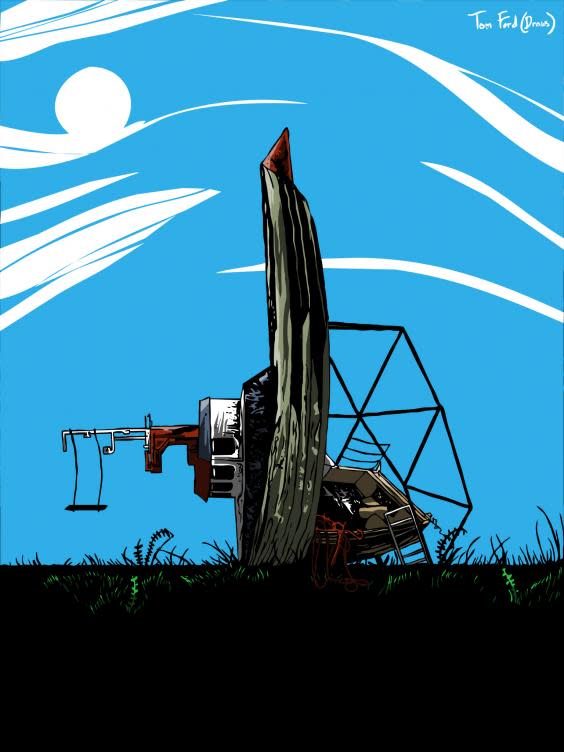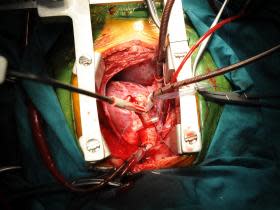You can't ask me that! Are you on the donor register?
Are you on the donor register? Like all questions to do with death, it’s not one that leads to an easy conversation. According to NHS Blood and Transplant, recent surveys show that while as many of 80 per cent of us agree with organ donation, only 33 per cent of us have actually told our families. We imagine we don’t need to have the discussion. If we’re on the register, our wishes will be upheld, right? Not necessarily.
Professor Roy J Thomas of the Centre for Life Ethics and Organ Donation at Swansea University explains: “Family refusals are the biggest barrier to organ donation even when a person has registered as an organ donor.”
There are more than 6,000 people in the UK waiting for a donation right now. And yet last year, 1,148 families declined to honour their deceased loved one’s wish to donate. While families have no legal right to override a potential donor’s decision, in practice their support is always sought. It’s estimated by NHS BT that if those families had upheld their loved one’s wishes, there might have been 3,000 extra transplants. Transplants that those people who took the time to register presumably would have wanted to go ahead.
Read more
Three organ transplant patients die of cancer contracted from donor
Professor Thomas, who is also chief executive of leading transplant charity Kidney Wales, asks: “Why is it that a family member can overturn the wishes of another family member in donating organs? Currently, the autonomy of the individual is being eroded. The human right of that individual to donate their organs is being overturned by those closest to them.”
The reasons families give for obstructing donor wishes are myriad and complicated. Most of the common worries are put to rest here. When you’ve just lost someone you love, the idea of donation can be too much to bear. You want to hold on to every part of them. How could allowing a surgeon to take bits of them away possibly honour them or help you to get through your loss?
As I write this, it’s the second anniversary of my father’s death. Though Dad had a big heart attack in 2011, his death in 2016 was a huge shock to all of us. He’d done well in the intervening five years, returning to a relatively active life. He was determined never to let heart disease define him. Just before he died, I met up with him and Mum at the tea shop at Guildford Cathedral, to hand over my nephew, who’d been staying with me in London for a few days. Mum and Dad were going to take him the rest of the way home. It was a beautiful day. Dad was on good form, joking and laughing as usual. We made plans to see each other again in a fortnight’s time at a family party. When we hugged goodbye in that car park – rushing to be out of the way of a funeral cortège – I had no idea that we were saying goodbye forever.
It was late in the evening a few days later when my sister called to say that Dad was gone. Kate was with Mum at the hospital. She asked whether I wanted to see Dad one last time. The hospital would wait for me. I knew I would not be able to get there until the following day. I also knew that Dad was on the donor register and if there was a chance that any part of him could be donated to someone who needed it, he would want that to happen. With donations, time is of the essence. So I said my goodbyes to Dad in my head and crossed my fingers that something of my beloved father could be saved.

The weeks that followed Dad’s death were predictably awful. Death involves so much paperwork and admin and you can’t just sob your way through it. Which isn’t to say we didn’t do a lot of crying. There were moments of dark comedy too. My sister’s normally placid Cockapoo tried to savage the funeral director, after a discussion of the hymns had me jump up from the sofa and run to the loo for a quick blub. The dog clearly thought she knew who was to blame for the sadness in the house.
That same day, when I told my older nephew that Dad’s death gave us carte blanche to use the F-word for a while, my younger nephew solemnly intoned: “You should never swear.”
The funeral was surreal. It took place on a beautiful September day. A perfect day for a family party. My sister hosted the wake at her home. Glancing out into the garden, I saw my wonderful brother-in-law and his father setting up an awning for shade. It seemed so obvious that Dad would be out there with them as he usually was. As an engineer, Dad knew instinctively how to make anything work. The lack of him was suddenly shocking and I had to sit on the stairs for a while. The dog came to check on me again, resting her head on my knee as she looked into my eyes. She was very busy that day, offering a consoling paw to anyone who needed it. I thought sadness would overwhelm us all.
A fortnight later, there was a crack in the clouds. Mum called to tell me she’d had a letter from the transplant department of the hospital. Though Dad was 78, they’d been able to use his corneas. Two women had received one each, enabling them both to see again.
He had especially lovely eyes, my dad. Cool blue and kind. When I remember them, they’re always crinkled at the corners by a smile. And I remember not just how Dad’s eyes looked but how he saw things. In life, Dad always saw the best in people and did whatever he could to help those who were struggling. He once arranged for an abandoned boat dredged from the Bristol Channel to be transported fifty miles, refurbished and transformed into a climbing frame at a playground for children with special needs where I was volunteering at the time.
If he couldn’t help in a thoroughly practical way, he always had a good joke. Like the time he came in from the garden carrying a toad and presented it to me – newly dumped by my first serious boyfriend – saying: “Kiss it. It may be your last chance.” He had a gift for making us see the lighter side. He also had a way of making us see what was fair. He listened to every point of view with an open heart and mind. He believed in equality. He believed in humanity.
While I don’t really think anyone who receives someone else’s organs in any way actually becomes the person who made the donation, like in a Disney movie, I hope that the women who received Dad’s corneas see a little more goodness in the world through his eyes.
It bears repeating that there are more than 6,000 people in the UK waiting for a donation today – 6,000 people whose lives are on hold. People like Shawn Ruck, who is waiting for a kidney transplant, who says: “More donors are needed. I hope their families know what they want but also that the wishes of the registered donor are respected. Like me, there are people who need their lives saved today.”
Dad understood that. At the time, Dad’s donation made the sting of losing him just a tiny bit easier to bear. Two years on, it gives me enormous comfort to think about it. It was exactly what he would have wanted. It was in keeping with the way he lived and the way he taught my sister and I to live too. It’s not so much that an actual part of him carries on but that his donation represented a continuation of his spirit and beliefs.
I joined the donor register when I was old enough to do so and my family know that there’s nothing I wouldn’t be happy to leave behind. If none of it is useful for donations, then science can have me instead. Meanwhile, I’m delighted that in 2020 England will join Wales and Jersey in having a system of “deemed consent” whereby people have to opt out of the donor register rather than opt in. The Isle of Man is also in the process of implementing legislation for deemed consent and in June of this year, the Scottish government introduced a bill for an opt-out system to be considered by the Scottish parliament. Northern Ireland won’t be changing to an opt-out system, but it has been consulting on how to promote organ donation there too.
I don’t think there is any one of us who can truthfully say we wouldn’t want our loved ones to be able to receive a transplant if they needed it, so why be squeamish about the other side of the equation? Maybe your religion tells you it’s wrong. In which case I’ll go out on a limb here and say, I don’t think there’s any god worth believing in who wouldn’t forgive us for giving up a piece of ourselves after death for the purpose of making someone else’s life better. And if that really is the way my god thinks, then I’ll gladly go to the other place.
What truly lives on of all of us after death is the way we make people feel when we’re around them. Dad knew how to make people feel understood, appreciated, supported and, most of all, loved. For those of us who knew him, that feeling will never go away. Whether you believe in organ donation or not, talk about with your dearest ones and vow to respect their wishes. Most of all let the part of you that lives on be love. You can make a living donation of some of that to anyone you want to right now.
Christine Manby has written numerous novels including ‘The Worst Case Scenario Cookery Club’


